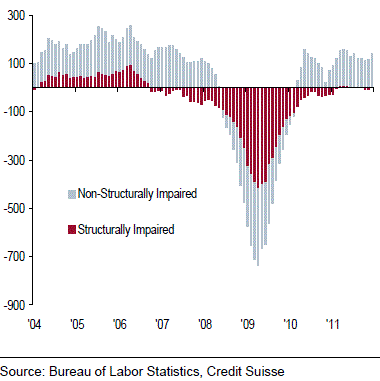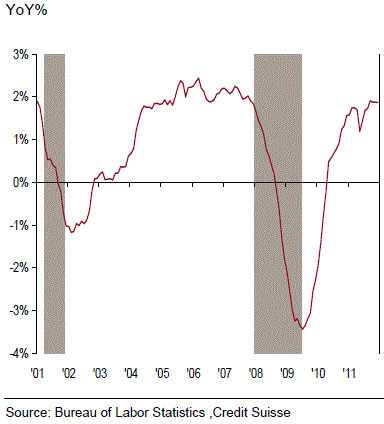Tyler Cowen's Blog, page 568
January 10, 2012
Specialization of science bleg
I am looking for good writings on whether science has become an overly specialized endeavor, and if so what are the scientific and social consequences of that development? Any leads you might offer would be most appreciated. Of course this could cover many different fields.

Haiti fact of the day
Economist Michael Clemens, my colleague at the Center for Global Development, suggests that four out of five Haitians who have escaped destitution have done so by leaving the country.
That is from Charles Kenny, here is more.

Assorted links
2. A pizza parable: when arbitrage becomes more costly.
3. Why Gideon is feeling strangely Austrian, and where are the liberals?, both very much on target.
5. Fukuyama on European identity and whether the French succeeded after all.

Limerick
There once was a Limerick that fell off the map,
The Irish said Google must take the rap,
They tried further zoom,
Cuz' there wasn't the room,
Making everyone happy ain't always on tap.
Here is a discussion of some of the design choices behind Google Maps.

Structurally impaired jobs vs. non-impaired jobs
Here is some text from the post:
One way to look at the US job market is to break it up into two components: jobs generated by structurally "impaired" and "non-impaired" sectors. Credit Suisse defines structurally impaired sectors to "include real estate related industries, finance, manufacturing, and the state and local government sector." These are the sectors that at least in part rode the "bubble" economy wave. Many of these jobs were credit dependent, with growth beyond what the economy could sustain naturally.
The chart below shows the job creation and loss of the two components. The structurally impaired sector jobs created during the period of over-capacity growth simply never returned. The sectors were highly credit dependent and with all the deleveraging taking place, the jobs are not likely to come back any time soon…
On the other hand job growth of the non-impaired sectors has almost returned to the pre-crisis levels.
Could it be that 2011 is what macroeconomic recovery looks like, minus the remaining structural problems? Hat tip goes to FT Alphaville for the pointer, and here is my earlier post on the disaggregated aggregate demand.

January 9, 2012
Markets in everything (and proud ye shall be)
Interesting throughout, but let's cut to the chase:
Advertising our altar bread is a positive thing for Cavanagh Company. We take a lot of pride in putting our family name on a product that will eventually become the body and blood of Jesus.
You can file that under "Very good paragraphs." How about this one?:
Had production remained the exclusive bailiwick of monastic communities, it is likely that the findings of Vatican II would have prompted some minor changes in Communion-wafer production. Among the guidelines issued by the Church was a directive to "make the bread look more breadlike," head of production Dan Cavanagh told me. It is a change whose significance may yet be lost on the millions of churchgoers who continue to think of hosts as a form of Styrofoam. Nevertheless, Cavanagh's more "breadlike" whole-wheat wafer caught on. It became the industry standard, and forced the Poor Clare nuns to follow suit.
Some of it is better than satire:
…the company maintains a fully-automated production process where employees are forbidden from laying their hands on the wafers. "I feel pretty strongly that the host should not be touched," Dan said. His view makes it easier to comply with legal guidelines for industrial food production, but it also gives the company something to market. "Our wafers are untouched by human hands," boasts one promotional brochure. "That gets my dander up," a Sister in Clyde told the Chicago Tribune: The Sisters' touch gives what other businesses would call "added value."
And what if you have coelic disease? Every paragraph in this story is fascinating. I thank Paul Hsieh for the pointer.

Assorted links
1. Interview with Esther Duflo.
2. Interview with Paul Collier.
3. Larry Summers on lots of stuff (FT link), without being interviewed per se.
5. Sen on Hume.

Arab Spring and the stability of monarchy
Victor Menaldo has a new paper:
This paper helps explain the variation in political turmoil observed in the MENA during the Arab Spring. The region's monarchies have been largely spared of violence while the "republics" have not. A theory about how a monarchy's political culture solves a ruler's credible commitment problem explains why this has been the case. Using a panel dataset of the MENA countries (1950-2006), I show that monarchs are less likely than non-monarchs to experience political instability, a result that holds across several measures. They are also more likely to respect the rule of law and property rights, and grow their economies. Through the use of an instrumental variable that proxies for a legacy of tribalism, the time that has elapsed since the Neolithic Revolution weighted by Land Quality, I show that this result runs from monarchy to political stability. The results are also robust to alternative political explanations and country fixed effects.
Here are his other papers.

Maybe those papers are correct?
As a small test, Zingales looked at the 150 most-downloaded papers that had been done on executive pay. He found that papers supporting high pay for top executives were 55 percent more likely to be published in prestigious economic journals. They were also much more likely to be cited in other papers.
Here is more. This is considered evidence for the "capture" of economists. Here is another article on the new code of ethics. It will hurt researchers who work in finance. From Olaf Storbeck, here is more, an interview with Gerald Epstein. Here is coverage from David Warsh. Here is coverage from The Chronicle. How many people will basically just stop publishing in the top journals?

Is there an easy way out of the eurozone?
Robert J. Barro writes:
Italy could have a new lira at 1.0 to the euro. If all the euro-zone countries followed this course, the vanishing of the euro currency in 2014 would come to resemble the disappearance of the 11 separate European moneys in 2001.
In the meantime, doesn't every euro — a few sticky grannies aside — leave the Italian banking system? Presumably the new lira is not pegged at 1-to-1 forever. Switching out of lira/euros in Italian banks, before the inevitable depreciation, would offer a short-run rate of return of at least thirty percent, maybe more. Or if such a peg holds, and can be enforced, and is seen as credible, isn't it just like the euro? (Do they deflate their economy by thirty percent or more to validate the exchange rate?) The difference being, of course, that with a separately marked currency it would be easier for Italy to leave the eurozone, which is one reason why a 1-to-1 peg would not be seen as eternally credible. I don't see how this transition works; am I missing some segment of Barro's argument?
By the way, the switch to the euro was easier for a few reasons. People believed the national currencies would become stronger (certainly for Italy), not weaker, and there were few doubts about the solvency of various banking systems. That said, the switch to the euro did give rise to unsustainable capital flows into the weaker countries and that is not working out well either.

Tyler Cowen's Blog
- Tyler Cowen's profile
- 844 followers





